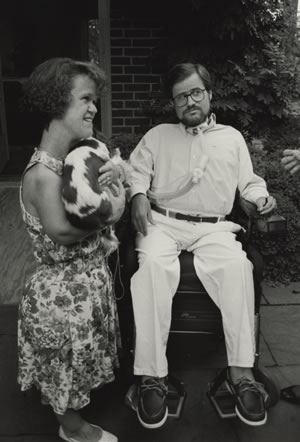Allan Macurdy
At Boston University Law School, Professor Allan Macurdy leads a discussion on right-to-die issues. He asks his students at what level they believe in the right to refuse life. As he runs down his “higher parade of horribles,” his students agree level by level that they would choose to live: as a simple paraplegic; in constant, moderate pain; with a physical incapacity; or even as a quadriplegic. When Allan arrives at the level “conscious but with mechanical ventilation,” nine out of ten of them choose death over life. A silence falls over the classroom. Their professor is in his third decade in a wheelchair and is entering his second decade breathing on a ventilator.
The danger of rigid rules is clear, Allan explains. “Human beings change their minds; they make decisions that they later don’t want [to have made] because they didn’t realize what they were willing to face,” he says. “Ten years ago, I would have said absolutely no to living with mechanical ventilation.” But now, Allan’s physical challenges have become his greatest strength. As a scholar and teacher, Allan works to shatter students’ assumptions of what it means to be disabled. As an administrator, he serves as a critical liaison between students with disabilities and Boston University. As an intellectual activist, he calls for a broader, more comprehensive perspective on all forms of disability. He echoes Martin Luther King, Jr.: “When we diminish one person’s freedom, we diminish all people’s freedom.”
Born in 1960 with congenital muscular dystrophy, Allan spent his childhood running away from disability services. As he grew up in Massachusetts, his level of debilitation increased and he progressed from being a “slow kid” to being full-time in a wheelchair. After college, he attended Boston University Law School. At first he avoided pursuing disability law, concerned that he would be labeled by his disability. After a summer job at the Institute for Law and Disability, he realized the contribution he could make by using his legal skills to help those with mental and physical disabilities. While still a law student, he revised and updated the nation’s most comprehensive review of federal and state laws against discrimination against the disabled.
Since 1988, Allan has taught at Boston University School of Law, where he works at the N. Neil Pike Institute for Law and Disability, generating legal briefs and public policy materials on emerging disability issues. He reaches a wide audience of his peers with law review articles and the general public through newspaper articles and television and radio interviews. Since 1996, in addition to teaching at Boston College, Northeastern, and the New England School of Law, he has served as Director of the Disability Services at Boston University, working to ensure that the university adequately addresses the rights and needs of disabled students.
Allan was deeply involved in fighting for the Americans with Disabilities Act of 1990. Over the past eight years, Allan has also been involved in a city lawsuit to make the Boston subway’s “green line” accessible to disabled riders. The green line is the only trolley line without wooden ramps and fold-down bridges for disabled citizens. Allan says he is involved in the lawsuit not as a lawyer, but “just as a citizen of the city.”
Allan is the founding board member of Partners for Youth Disabilities, a mentoring program that matches youth and adults facing similar physical challenges. Through his work with the program, he met Marie Trottier, who coordinates Harvard University’s disabilities policies and planning. Now married, Marie and Allan are a team of tenacious and persuasive advocates for the rights of Boston individuals with disabilities. While Marie is four feet tall, Allan explains that “underestimating her is not a wise move.”
Allan struggles against assumptions that he is pursuing a singular agenda. “When I ask a property law question, I think people have it in their heads that I’m a disability lawyer,” he explains. “No. I’m a law professor first.” Similarly he worries that within the disability advocacy movement, narrow agendas can make it difficult to solidify all civil rights advocacy groups. To the refrain “We [the disabled] are the most oppressed group,” he counters, “Disabilities cut across all boundaries—we will not get anywhere when others go down.”
Allan Macurdy believes in the credo of the Good Samaritan. “I believe we’re not just responsible for feeding hungry people, but finding out why they are hungry and doing something about it.”
 Photo by Dorothea von Haeften
Photo by Dorothea von Haeften